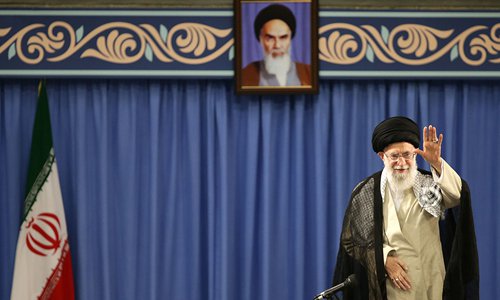War not an option for the US or Iran
By Qian Xuming Source:Global Times Published: 2019/6/27 17:48:40 Last Updated: 2019/6/27 23:15:56

Photo: IC
After Iran shot down a US drone on June 20, US President Donald Trump approved retaliatory strikes on Iran then abruptly canceled them. However, Trump reportedly approved a cyberattack on Iranian computer systems that control rocket and missile launches.
"Let's make Iran great again," Trump said on Saturday, expressing his wish to make a new deal with the Islamic republic. The apparent change of the White House's attitude toward Iran has drawn attention.
Trump imposed new sanctions on Iran on Monday to pressure the country's supreme leader Ayatollah Ali Khamenei and the institutions led by him. "Today's actions follow a series of aggressive behaviors by the Iranian regime in recent weeks, including shooting down of US drones," a statement by Trump published by the White House showed. Trump continued that "the Supreme Leader of Iran is one who ultimately is responsible for the hostile conduct of the regime."
The move will bar Ayatollah Ali Khamenei, his office and other relevant officials from accessing important financial sources, according to media reports. The US Treasury Department said eight senior military commanders of the Islamic Revolutionary Guards Corps are also targets of the latest sanctions.
In addition, the US State Department noted that its maximum pressure campaign against Iran won't be eased until Iran decides to negotiate a new deal.
Amid this latest spat between the US and Iran, Trump's response to the drone incident was quite restrained. There could be three reasons why Trump stopped airstrikes on Iran.
First, he was worried that Iran would launch more counterattacks. The US Defense Department has prepared for a war with Iran, including limited retaliatory conduct in cases like the drone downing. But the US Army is concerned that Iran could expand warfare by various counterstrikes and disrupt US strategic arrangements.
Second, Trump is concerned about his re-election campaign. In his first term, Trump has upheld the "America First" policy and has undertaken a strategic contraction in the Middle East. He has partly withdrawn US troops from Syria and vowed to bring US soldiers back home from Afghanistan. If he launches attacks on Iran, it would contradict his election promise, particularly if the war escalates.
Third, a war with Iran is not consistent with US general strategy. The US National Security Strategy released in December 2017 has clearly listed China and Russia as the main competitors, followed by Iran and North Korea. As US natural gas and crude oil production increased at a fast pace in 2018, the US is reducing dependence on the Middle East for energy and it doesn't want to be involved in another war in the region, which will consume large sums of money.
Escalation of frictions between the US and Iran would inevitably trap the US in the Middle East, which would affect the US overall plan to deal with competition from other big powers.
There are three possible ways for US-Iran relations to go: Both sides restart negotiations under the mediation of third parties; tensions are prolonged for a relatively long period of time; or a war breaks out between the two countries. In fact, neither Trump nor Khamenei seeks a war.
US policy in the Middle East is a combination of "America First" and pragmatism.
On the one hand, the US government uses its resources for domestic economic development and strategically retreats from the Middle East. Trump doesn't want to be stuck in an unbeneficial war with Iran.
On the other hand, Washington wants to gain in the Middle East by creating tensions in the region, thus roping in rivals of Iran through sale of weaponry.
After declaring to run for re-election on June 17, Trump can gain more votes from American Jewish people and hardline Christians by being tough on Iran. But the uncertainties of a war would limit the Trump administration's military venture.
"There won't be any war… negotiations are a poison," Khamenei said on May 14. This was actually a euphemistic way of saying Iran won't take the initiative to challenge the US stance.
The two countries have a big difference in national power. Hence, a war will undoubtedly consume Iran's strategic and economic resources. Engagement in a war - regardless of its scale - would seriously jeopardize the prestige of the Islamic republic.
All in all, renegotiations or even protracted tensions are relatively better options for both Washington and Tehran.
The author is an associate research fellow at the Middle East Studies Institute of Shanghai International Studies University. opinion@globaltimes.com.cn
Posted in: VIEWPOINT,WORLD FOCUS